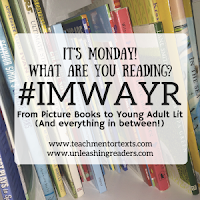April 1, 2023 by Word Galaxy
E ARC provided by Edelweiss Plus
At least one review of middle grade literature every single day, and years of reviews going back to 2006. All the #MGLit you could ever want.



 Marquis, Krystal. The Davenports
Marquis, Krystal. The Davenports
January 31, 2023 by Dial Books
E ARC provided by Edelweiss Plus
In 1910 Chicago, the Davenports run a successful carriage business and live on a large estate. The children include John, who helps out with the factory and is interested in the new fangled automobile, Olivia, who is "out" in society and knows she needs to secure a good marriage, and Helen, who eschews the societal norms of the time and works, unbeknownst to her father, in the machine shop. Olivia sometimes despairs of making a good match, since the affluent Black society is somewhat limited, but her friend Ruby feels the pressure even more. Her father is running for mayor. He faces an uphill battle because of his race, and the family's finances are not good. She has always been interested in John, but fears that he is interested in one of the Davenport's maids, Amy-Rose. In order to gain his attention, she starts a courtship with another man in their circle. Amy-Rose is interested in John, but more interested in starting her own salon focusing on hair and skin care for Black women. She is saving money, and has even located a store she can rent once she saves enough. Even Helen is not immune from romantic entanglements; while Olivia has her eyes on a new man in town, he is more interested in Helen, and Olivia takes an interest in a civil rights leader who challenges her privileged thinking. Times are changing in 1910: the car is new on the scene and swiftly being adopted, social classes intermingle more, and Black people are demanding change. Against this background, the Davenports romances and interests create a picture of early twentieth century Chicago that is not often seen.
Strengths: The cover of this one really caught my eye; it was so striking that an administrator attending a meeting in the library saw it when she came up to the desk (hey, there was a meeting, so I was looking at upcoming books because I couldn't have students visiting!) and was intrigued as well! It's a fun story, and given the social mores of this time period, the romances are all contained to "deepening kisses" and longing sighs, making this a good level of romance for sensitive souls. I particularly enjoyed the fact that Olivia and Ruby are women of their time, and proceeding along paths that women at that time would not have questioned all that much. For forward thinking women, we do have Helen and her mechanics work, and Amy-Rose and her business aspirations. There's just enough history and current events to tether this to 1910 Chicago, and many of the older characters have ties to enslaved people, or experiences of that opressive history themselves. There's even some levity, with Helen having to take comportment lessons from a parson's widow. This is a longer book (384 pages), but it moved quickly. I enjoyed this a lot, and was able to write the review without consulting the book, which always speaks well for how students will be able to comprehend a book.
Weaknesses: I would have enjoyed a bit more historical detail and fewer complicated romantic entanglements. This has been compared to Downton Abbey, which is fair. The difference if that, as a television series, Downtown can have all of the romantic entanglements acted out, because the house, clothing, etc. details are all shown and don't have to be described. It's a tough balance with writing.
What I really think: This reminded me a bit of Meredith Tax's 1982 Rivington Street, one of those books I owned for years, gave away, and regretted it. There's something about a family saga that appeals to me. I'm not entirely sure if middle schoolers want to read this, but I really want to buy it. Back in 2014, I did buy Longshore's Manor of Secrets, and it's checked out right now. Maybe it will be good for some of the teachers to read. Did suggest that the public library buy a copy, but I may need one at school as well.







